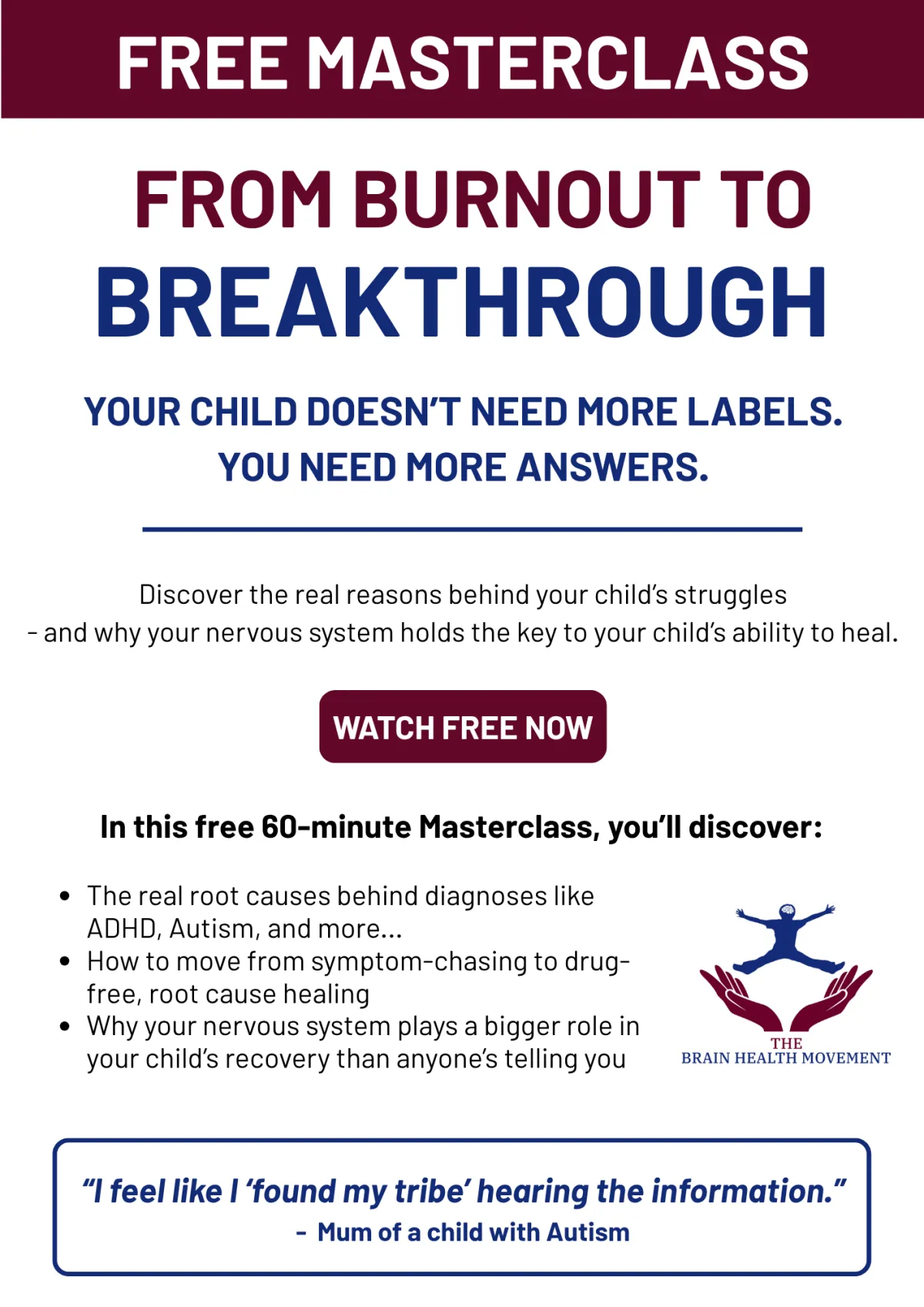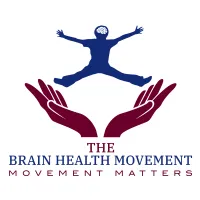FREE MASTERCLASS - Discover the real reasons behind your child’s struggles and what to do next.
THE BRAIN HEALTH MOVEMENT
Kind - Empowering - World Class - Education.
BLOG

The Missing Link in Your Child’s Healing | Nervous System
What if feeling safe in your body is the first step in helping your child feel safe in theirs?
We talk a lot about our children’s stress.
Their meltdowns, their rigid thinking, their emotional rollercoasters.
We try therapies.
We overhaul diets.
We whisper affirmations through gritted teeth.
But here’s a hard-won truth I had to learn the long way:
If I’m not regulated, it’s almost impossible for my child to be.
Their little nervous systems borrow ours.
Their sense of safety starts in our bodies — not our words.
And no sensory diet or sleep chart in the world can override a parent in chronic fight-or-flight.

Stress Isn’t Always the Enemy - But Dysregulation Is
Did you know that some stress is actually good for neurological development?
Short-term, age-appropriate challenges (like learning to swim or handling minor disappointments) can actually build resilience and strengthen Vagus nerve function.
But here’s the problem:
most of us - and our kids - are stuck in the wrong kind of stress.
🚨 Chronic stress.
🚨 Sensory overload.
🚨 Routines that have collapsed over summer.
🚨 Parents pushing through exhaustion and calling it strength.
When the nervous system gets stuck in high alert, the Vagus nerve can’t do its job.
We lose access to rest, digestion, immune repair, and - most heartbreakingly - connection.
It’s not that we need to eliminate all stress.
We need to build the capacity to recover.
And that starts with us.

From Overwhelm to Regulation:
How to Build Nervous System Resilience - For You and Your Child
Why Feeling Safe Inside Your Body Might Be the First Step in Your Child’s Healing
Why It Feels Like Everything’s Too Much
If your child is struggling with emotional outbursts, meltdowns, sleep issues, or anxiety — you’re not imagining it.
And if you’re feeling burnt out, guilty, or like you’re failing — you’re not alone.
What’s often missed in the sea of therapies and strategies is this:
Your child’s nervous system is borrowing yours.
And if your own nervous system is stuck in survival mode, your child’s sense of safety will be too.
Understanding Stress — The Good, The Bad, and The Chronic
Most people think of stress as purely harmful. But the reality is more nuanced.
Short-term, manageable stress — like learning a new skill or navigating a social challenge — can build neurological strength.
This kind of “good stress,” known as hormetic stress, helps children develop resilience and adaptability.
But the problem comes when:
Stress is chronic
The nervous system doesn’t get a chance to recover
Parents are operating from burnout, not regulation
This kind of stress suppresses the Vagus nerve (the body’s main “brake pedal”), leaving both you and your child stuck in fight, flight, or freeze.

Over time, it can lead to
Digestive issues
Sleep disturbances
Emotional dysregulation
Poor immune response
Behavioural challenges labelled as ADHD, anxiety, or sensory issues
The symptoms might look different from one child to the next - but the neurological root is often the same.
Why Routine (Even Flexible) Helps Regulate
During summer or school holidays, routines tend to collapse.
Bedtimes stretch, mornings start late, screens sneak in, and suddenly no one knows what day it is.
That freedom is lovely - until your nervous system starts feeling unsafe.
Routine isn’t about rigidity. It’s about rhythm.
Our brains feel safest when they know what’s coming next. This is especially true for children, but it’s just as essential for adults.
Try establishing anchors at the start and end of the day:
Morning moment of connection before screens or stress
Predictable bedtime rituals (even just the same order of steps each night)
These quiet rhythms signal to the brain:
“It’s safe to rest now.”

Signs Your Child (and You) May Be Dysregulated
Children can’t always say “I feel overwhelmed” — but their bodies will show it.
Look for:
Sleep disruptions
Digestive discomfort
Mood swings or meltdowns
Clinginess or withdrawal
Inability to transition or focus
In parents, dysregulation shows up as:
Cleaning while you're in the bath (ask me how I know)
Snapping at the tiniest things
Exhaustion that no amount of sleep fixes
Inability to relax, even when given time
The truth? This isn’t weakness.
It’s a nervous system operating in survival mode.
Good News: Patterns Can Change
Your nervous system isn’t broken.
It’s patterned.
And those patterns can change.
Through simple tools, Vagus nerve activation, rhythm, and nervous system-focused support - you can begin to rewire your stress response.
And when you do?
You expand your capacity. Your child feels that safety. And healing can finally begin.
Want to Go Deeper?
From Burnout to Breakthrough: How Your Nervous System Shapes Your Child’s Recovery
Free Masterclass with Lucia Silver & Dr Kylie Foster
In this masterclass, you’ll learn:
Why burnout isn’t about willpower — it’s about capacity
What co-regulation really means, and why therapy won’t work if you’re dysregulated
How your child’s symptoms may be linked to your nervous system state
3 simple, practical tools you can use starting today
Stop chasing symptoms. Start healing the root cause.
Stop chasing symptoms.
Start healing the root cause.

FREE MASTERCLASS
"From Burnout to Breakthrough"
Your child doesn’t need more labels.
You need more answers.
Discover the real reasons behind your child’s struggles - and why your nervous system holds the key to your child’s ability to heal.
Need More Support?
If you're feeling overwhelmed and just need to be heard and supported to work out the best next step, then book a 1:1 Parent Support session with Lucia.

